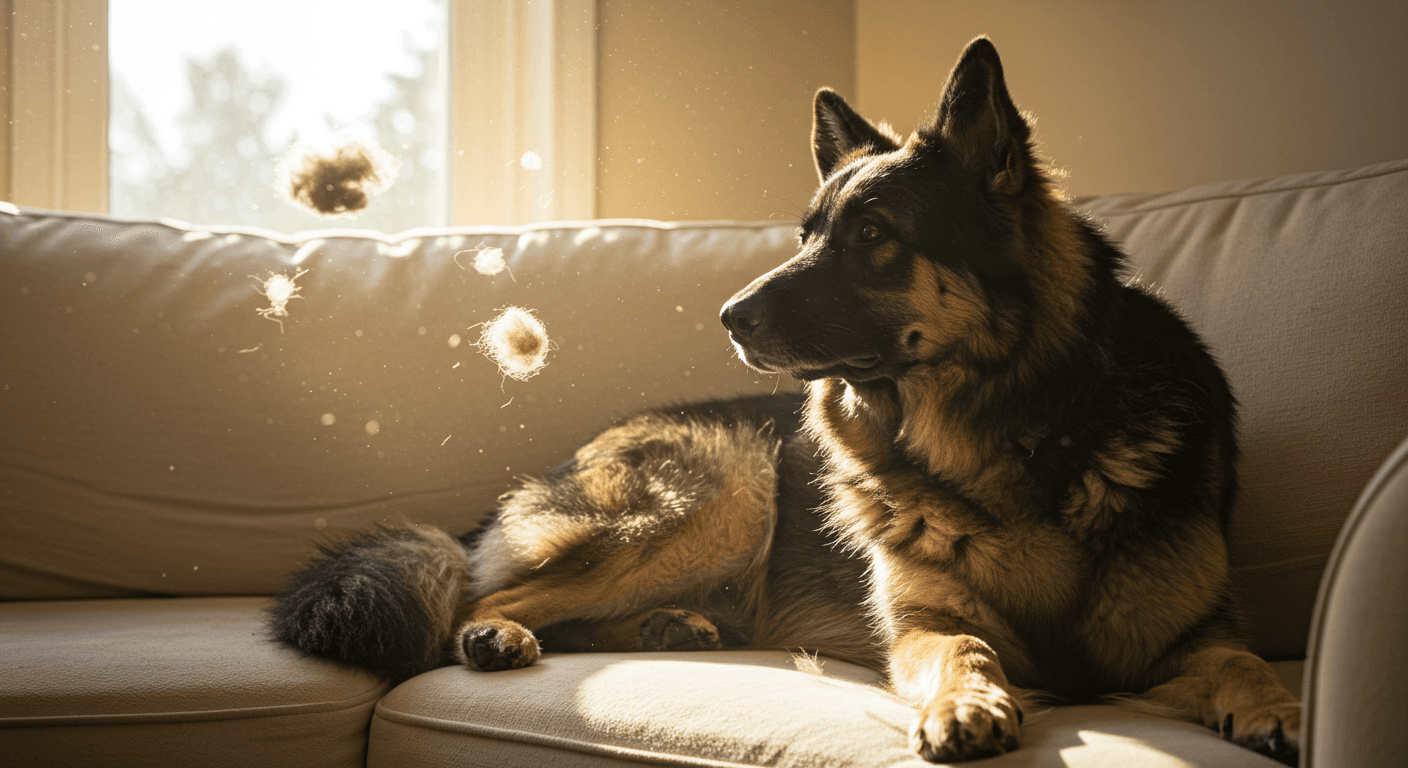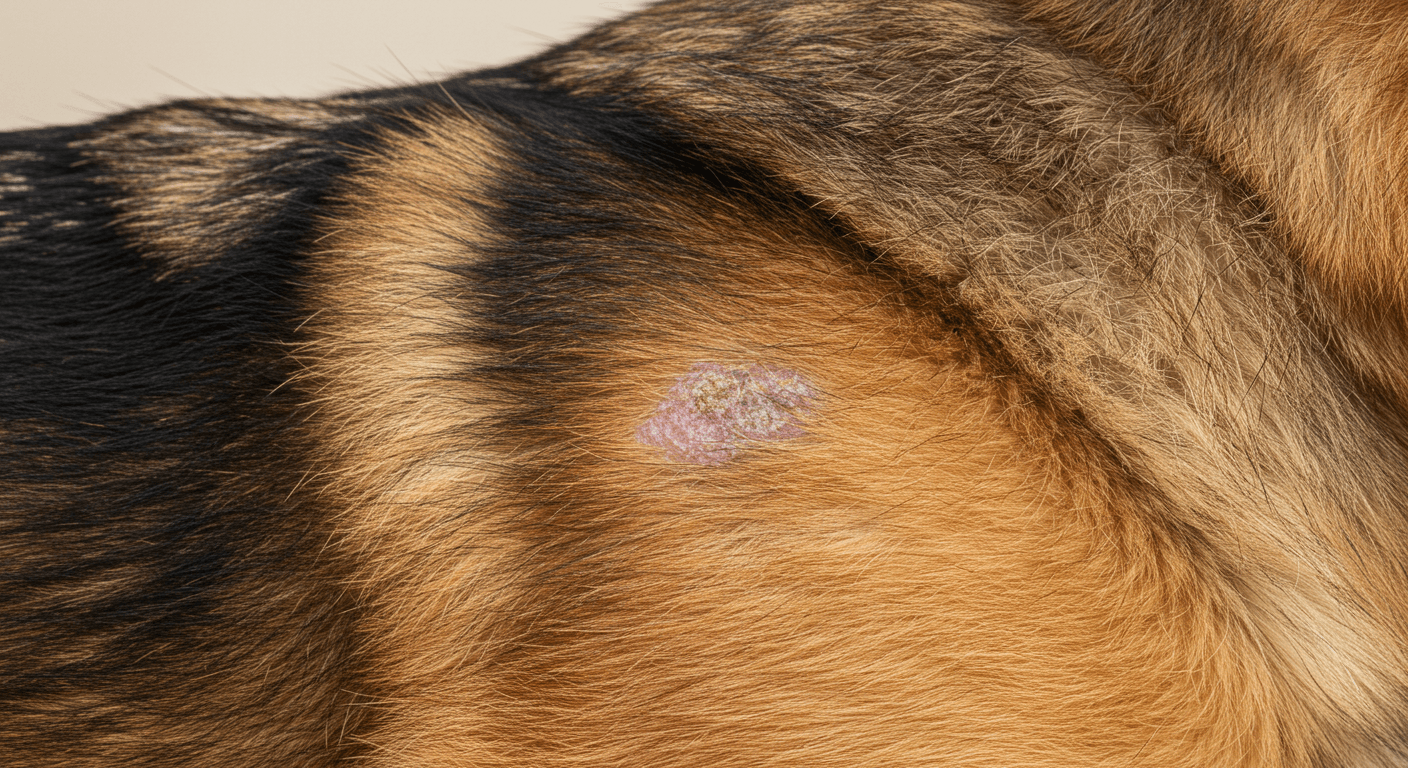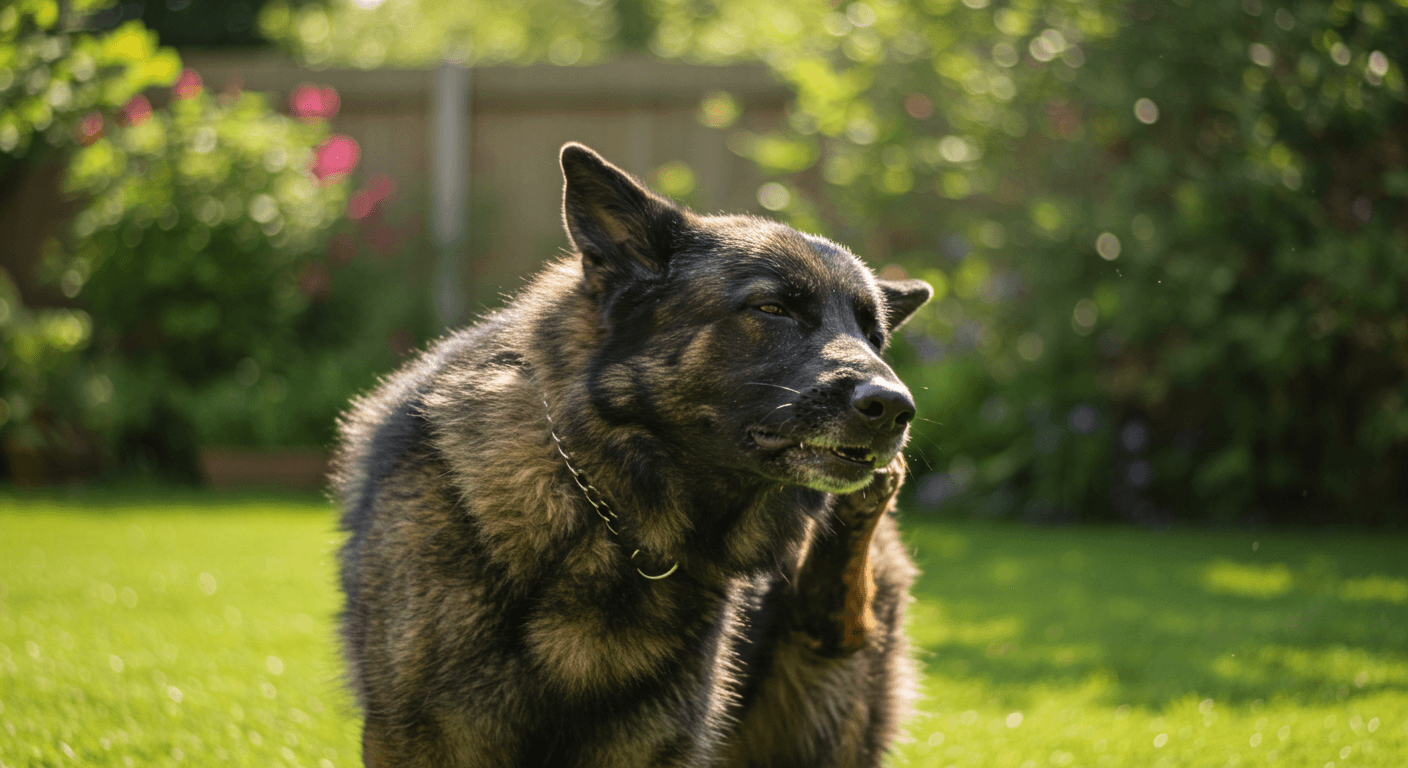If you're a German Shepherd owner or thinking about getting one, you've probably asked yourself, are German Shepherds hypoallergenic? It's a common question, especially for people who have allergies or live with someone who does. After all, bringing a dog into your home should come with comfort and not sniffles or sneezes.
Many people assume some dogs are completely allergy-free, but the truth is a bit more complex. German Shepherds are known for their intelligence, loyalty, and strong work ethic. However, when it comes to being hypoallergenic, things can get a little tricky.
In this guide, we’ll break down how German Shepherds can affect allergy sufferers. We’ll also give you simple, helpful tips on how to reduce allergen exposure if you already share your home with a GSD. Whether you've just brought home a fluffy pup or are still deciding, we’ll help you understand what to expect when it comes to dog allergies and how to manage them.
So, let’s dig into the details of what makes a dog hypoallergenic, how German Shepherds measure up, and what that means for your everyday life with this amazing breed.
What Does 'Hypoallergenic' Actually Mean?

If you’ve ever asked yourself, "Are German Shepherds hypoallergenic?" the answer begins with understanding what 'hypoallergenic' really means. It's a word you might see on dog food bags, pet ads, or allergy-friendly products. But let’s break it down in simple terms.
Hypoallergenic doesn’t mean completely free of allergens. Instead, it means something is less likely to cause an allergic reaction. In terms of dogs, a hypoallergenic breed is one that usually causes fewer allergy symptoms compared to others. This is important for people who are sensitive to dog dander, saliva, or even urine all common sources of allergic reactions.
Some people think short-haired dogs must be hypoallergenic, but that’s not always true. Allergies come from proteins found in a dog's skin flakes (called dander), not just their fur. Even dogs that don’t shed much can still trigger allergies if they produce a lot of dander.
So when exploring the question, "Are German Shepherds hypoallergenic?" remember that it’s not just about how much fur they leave on the couch. It’s really about how much dander and other allergens they release. That’s why some people may react differently to the same breed.
The truth is, no dog is 100% hypoallergenic. However, some dogs may be better for people with allergies than others. As we go further in this guide, we’ll take a look at how German Shepherds rank and how you can manage allergens if you already share your home with one.
Are German Shepherds Hypoallergenic Dogs?
German Shepherds and Allergy Triggers

If you're a proud German Shepherd owner or thinking about becoming one, it's important to understand how these amazing dogs can affect allergies. A common question asked is, "Are German Shepherds hypoallergenic?" The short answer is no, they are not. But let’s get deeper into why that is and what you can do about it.
German Shepherds are known for their loyalty, intelligence, and beauty. However, they are also heavy shedders. This means they release a lot of dander, which is a big allergy trigger. Dander is made up of tiny flakes of skin and saliva that stick to the fur and spread through the house. When the dog sheds, these particles become airborne, leading to sneezing, watery eyes, and other allergy symptoms.
Some German Shepherds can also suffer from skin conditions that make matters worse. These skin issues, like dry patches or hot spots, create even more flaking and shedding. More shedding means more potential allergies for human family members. If someone in your home has pet allergies, it’s important to keep an eye on the dog’s skin health as well.
Keep in mind, it’s not just the fur that causes problems. German Shepherd allergies are often triggered by proteins found in their skin oils, urine, and saliva. So even if you keep the hair under control, you still need to take steps to lower allergy risks overall.
Understanding the connection between a German Shepherd's shedding and allergens can help you manage your home environment better. With some simple changes, you and your German Shepherd can enjoy a healthy, happy life together.
Common Skin Issues and Allergies in German Shepherds

German Shepherds are known for their loyalty, intelligence, and beauty. But if you're a proud GSD owner, you may have noticed they sometimes deal with itchy, flaky skin. Understanding common German Shepherd skin issues can help your pup stay happy and healthy. Spotting signs early also helps prevent discomfort and serious allergic reactions.
Skin problems in German Shepherds are not rare. In fact, issues like dryness, rashes, and redness affect many dogs in the breed. Some skin problems are genetic, while others link to food, grooming products, or even the environment. It’s important to know the causes so you can take steps to avoid them.
- Dry Skin – German Shepherd dry skin can show up as flaky patches, itchiness, or a rough coat. Cold weather, frequent bathing, or poor nutrition might be the cause.
- Hot Spots – These are red, sore areas usually caused by scratching or biting. They can appear quickly and spread fast.
- Allergies – GSD allergies often come from things like pollen, dust, mold, or food ingredients like chicken or grains. Allergic reactions often show up on the skin.
- Yeast Infections – Moist areas like between the paw pads or under the ears may develop yeast infections if not kept clean and dry.
- Mange or Fleas – Parasites are another common source of irritation and can cause major discomfort if not treated.
If you notice any of these skin issues in your German Shepherd, don’t ignore them. Early care can prevent infections and reduce stress for your dog. Plus, dealing with allergies and dry skin can even help reduce how much your dog sheds – a big plus if you're wondering "are German Shepherds hypoallergenic?"
In the next section, we’ll show you how to spot allergy symptoms in your dog and what steps you can take to treat them at home.
Managing Allergies While Living With a German Shepherd

Living with a German Shepherd is a joyful experience, but if you or someone in your home is prone to allergies, things can get tricky. While many pet lovers wonder, "are German Shepherds hypoallergenic?" the truth is, they’re not. German Shepherd allergies are common, and they can affect both the dog and its owner. Luckily, there are steps you can take to manage allergy symptoms and enjoy life with your furry friend.
First, it's important to know that German Shepherds shed a lot. Their thick double coat sheds year-round and even more during seasonal changes. This shedding spreads dander, which is a common allergen, throughout your home. But don’t worry. With consistent care, you can reduce dander and keep sneezing to a minimum.
- Brush Daily: A soft-bristle brush or deshedding tool can remove loose fur and reduce allergens. Try brushing your German Shepherd outdoors to keep dander out of the house.
- Bathe Monthly: Use a gentle dog shampoo to wash away dirt and allergens. If your dog suffers from German Shepherd dry skin, look for moisturizing shampoos made for sensitive skin.
- Use HEPA Filters: Adding a HEPA filter to your air purifier or vacuum cleaner helps trap pet dander before it spreads through your home.
- Wash Bedding Weekly: Allergens love to stick to fabric. Wash your dog’s bedding and yours once a week in hot water.
- Create No-Dog Zones: Consider making certain areas of your home, like the bedroom, off-limits to your German Shepherd to reduce nighttime allergy flare-ups.
Don’t forget to check your dog’s skin regularly, especially if you’re dealing with German Shepherd dry skin. Skin problems can make your dog shed even more, which means more allergens in your home. A healthy dog equals a more allergy-friendly environment.
So, while the answer to "are German Shepherds hypoallergenic" might be a no, managing German Shepherd allergies is definitely possible. With just a few changes to your routine, you can create a happy and comfortable home for both you and your pup.
How Do German Shepherds Compare to Other Breeds?
When wondering, "Are German Shepherds hypoallergenic?" it’s natural to look at how they compare with other popular breeds. While no dog is truly allergy-free, some breeds are more allergy-friendly than others. Let’s take a closer look at how German Shepherds stack up against other well-loved dogs when it comes to potential allergic reactions.
One common comparison is with Australian Shepherds. You might ask, "Are Australian Shepherds hypoallergenic?" Similar to German Shepherds, they are not. Both of these breeds have thick double coats that shed significantly especially during seasonal changes. Their fur, dander, and saliva can all trigger allergies, making them less ideal for sensitive owners.
Now, let’s look at a few other breeds to understand allergy potential:
- Pit Bulls – If you’ve been wondering, "Are Pit Bulls hypoallergenic dogs?" the answer is no. While they shed less than German Shepherds, they still produce plenty of dander.
- Pugs – Many ask, "Are Pugs hypoallergenic?" Sadly, Pugs shed a surprising amount for their size. Their short coats don’t protect against allergens.
- Huskies – You may think their beautiful coats offer hypoallergenic features, but no. "Are Husky dogs hypoallergenic?" Not at all they shed often and heavily.
- Bulldogs – If you're wondering, "Are Bulldogs hypoallergenic?" they are not. Despite having short fur, Bulldogs produce a lot of saliva and skin oils, which can be big allergy triggers.
- Doberman Pinschers – And what about, "Are Doberman Pinschers hypoallergenic?" They have short coats and shed less than many breeds, but they still produce dander and are not allergy-safe.
In the end, no breed is 100% hypoallergenic, including German Shepherds. But by comparing their shedding, dander level, and coat type with other breeds, you can see where GSDs fit on the allergy scale. If allergies are already a concern in your home, choosing a breed with lower allergen levels might be the better path.
So, are German Shepherds hypoallergenic? The short answer is no. While they are beautiful, loyal, and smart dogs, German Shepherds are not the best choice for people with dog allergies. They shed a lot, especially during the spring and fall, and they produce dander, which is a common trigger for allergies.
That doesn’t mean it’s impossible to own one if you or a family member has allergies. There are ways to manage German Shepherd allergies at home, like grooming often, using air purifiers, and keeping the house clean. Some allergy sufferers even find they can live with a German Shepherd if they take these steps seriously.
While German Shepherds are not hypoallergenic dogs, with the right care, lifestyle improvements, and possibly medical advice, many allergy-prone families still enjoy life with one. It all comes down to how much time and effort you’re willing to put into cleaning and managing allergens.
Remember, no dog is 100% hypoallergenic, but by understanding your triggers and preparing ahead of time, you can make the best choice for your home. If you truly love the breed and are willing to manage the challenge, the rewards of owning a loyal GSD may be worth it!
Always spend time with a German Shepherd before bringing one home if allergies are a concern. Doing a trial visit or fostering first can help you find out how your body reacts. That way, you make a safe, happy choice for both you and your future furry friend!



